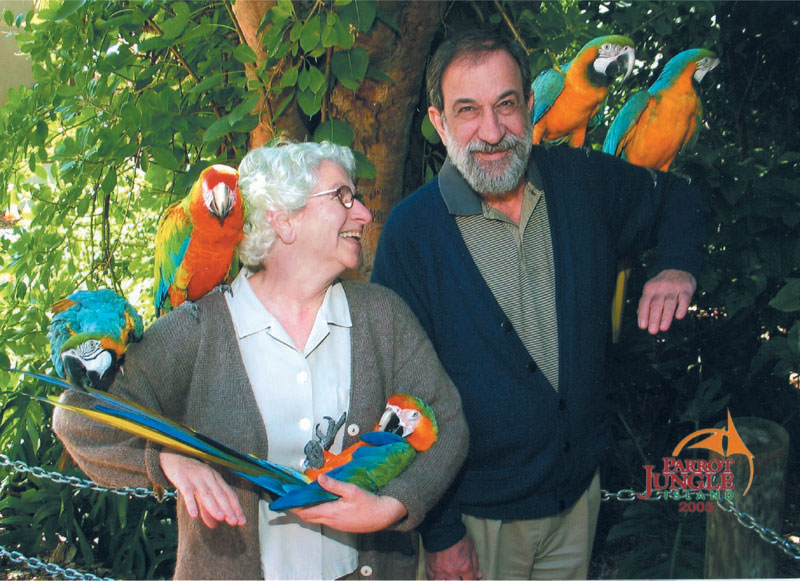Sarah Soghomonian
Staff Writer
 Award winning author David Kherdian and his wife Nonny Hogrogian, an award-winning illustrator, spoke about their latest work on May 2, on the campus of Fresno State.
Award winning author David Kherdian and his wife Nonny Hogrogian, an award-winning illustrator, spoke about their latest work on May 2, on the campus of Fresno State.
The couple, who reside in Spencertown, N.Y., read from and talked about their newest books, The Song of the Stork and Other Early and Ancient Armenian Songs, a book of poems which Kherdian translated from the Mekhitarists and which Hogrogian illustrated, Hogrogian’s personal memoir Finding my Name, and Kherdian’s Letters to My Father.
Kherdian was born in Racine, Wis., in 1931. He studied philosophy at the University of Wisconsin, but made a career as an author after he discovered his talent for writing in his early 20s.
Kherdian loves the process of writing and the gathering of ideas for projects. He has published 63 books, which cover a wide range of styles. Novels, memoirs, biographies, bibliographies, anthologies, picture books for children, translations and retellings, Kherdian has done it all, but his true love is poetry.
William Saroyan called Kherdian, ‘A poet with authentic voice and style, with universal appeal.’
“I’m a natural writer,” Kherdian said. His early experiences with reading, travel and odd jobs has played a role in Kherdian’s writing as did his association with William Saroyan, his mentor when he was first starting out.
Kherdian said his prose does not have a particular style, and says his poetry does not resemble anyone else’s. “I think it is important to understand that there is a peculiar sensibility that drives the writing of all Armenian writers,” he said. “At one time most if not all of us were compared to Saroyan, because he came first, in the sense that we were taking something from him that was his, whereas in truth we all sound somewhat alike because of this Armenian sensibility we share.”
Of all his books, Kherdian’s favorite is his latest, Letters to My Father, in which Kherdian writes poetry to his father. “It is my greatest accomplishment as a writer, but more importantly, through the writing of it I was able to bring resolution to our relationship while he lived, and in the writing of it I discovered just how much he loved me and how much I loved him. It is a book of homage and discovery,” he said.
Kherdian, who writes little now, but at his peak wrote daily, taking only short breaks between books, received the Newberry Honor Award for The Road from Home. He also has received the Jane Addams Peace Award, the Friends of American Writers Award, the Lewis Carroll Shelf Award and the Boston Globe/Horn Book Award.
Most of his awards were for The Road from Home, which has been published in most European countries, the U.K., and Japan, and has remained in print in this country for 26 years.
Kherdian was the editor of Ararat magazine and was the founding editor of Forkroads: A Journal of Ethnic American Literature, as well as Stopinder: A Gurdjieff Journal for Our Time.
Hogrogian, who was the art director for each of these journals, was born inNew York City in 1932 and graduated from Hunter College.
Hogrogian, who first discovered her artistic ability when she was 5 years old, began working as an artist in her early 20s. She is an award-winning children’s book illustrator that enjoys drawing animals the most. Hogrogian enjoys her work the most when the work begins to flow and it is the most true to her vision, she said.
It takes between six months and a year for Hogrogian to complete a book. Once finished she takes a complete break, she said.
Hogrogian was awarded the Caldecott Medal for One Fine Day, an Armenian folktale, and Always Room For One More, a Scottish folktale by Sorche nic Leodhas. She was also awarded the Caldecott Honor Book Award for The Contest, an Armenian folktale.
Kherdian and Hogrogian married 34 years ago, after they met when Hogrogian illustrated the cover of Kherdian’s book Homage to Adana.
Hogrogian helped Kherdian run three separate small presses, including The Giligia Press. Running a press takes a lot of time and work. Everything was done by hand, including setting the type, printing, making marbled endpapers and binding, Kherdian said.
The couple occasionally gives lectures at colleges, universities and Armenian churches and institutions. They like to spread the knowledge of their art.
“Art is not a luxury that we go to in order to fill an empty hour or vacant evening, but rather needs to be a crucial component of our spiritual life, if we have a spiritual life. There is a great stress on education right now, which is necessary for the material well-being of people, but the arts are being sorely neglected because they are seen as an impractical luxury. This has led to a coarsening in people. Art at its best can change hearts and minds, and we would not be making our work available through these personal appearances if we did not believe this was possible,” Kherdian said.
 Hye Sharzhoom Armenian Action
Hye Sharzhoom Armenian Action